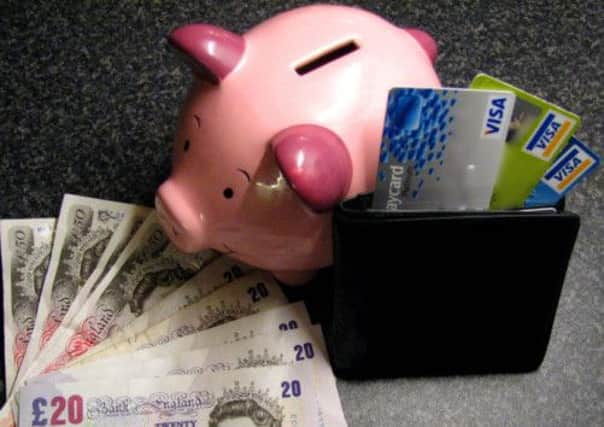Debt fears as families feel the financial squeeze


The Consumer Insight Tracker run by the Which? group found that nine million households are struggling financially amid spiralling food and fuel bills, compared to just 7.5 million last year.
However, a higher proportion of people say the economy will get better in the next year – up from 16 per cent last year to a quarter this year – and 10 per cent fewer people now describe the economy as poor.
Advertisement
Hide AdAdvertisement
Hide AdConsumers also say they are less likely to cut back on non-essential spending than a year ago, especially on “big ticket” household purchases, home improvements and holidays.
But Which? warned a combination of increased spending, combined with squeezed household finances, could see consumers pushed back into a higher level of personal debt, which has decreased dramatically since the onset of the recession five years ago.
Richard Lloyd, Which? executive director said: “Consumers are looking on the bright side but millions more households are facing a prolonged squeeze on their finances. This implies they are getting used to the tougher financial climate or relying more heavily on savings or credit to get by.
“Consumers may be aiding our fragile economic recovery but using savings and getting into debt is not sustainable and more people are now feeling the squeeze. The Government must do more to keep spiralling housing, food and energy prices in check.”
Average consumer borrowing, including credit cards, motor and retail finance deals, overdrafts and unsecured loans, per UK adult was £3,208 in May, according to Credit Action – down from £4,900 per average UK adult at the end of May 2008.
But the Which? study found that in the last year, on average, 6.1m households dipped into savings each month for necessary spending, while 4.7m households relied on overdrafts, and one million on unauthorised overdrafts.
The tracker also found that only a quarter of people expect their personal financial situation to improve and three in 10 consumers continue to cut back on essential spending.
Households are currently facing huge inflation on essentials, with food prices up by 4.3 per cent year on year, and energy bills up by around eight per cent. In the last year, two-thirds of the population have said the economy is having a negative impact on their personal finances.
Advertisement
Hide AdAdvertisement
Hide Ad“This data mirrors our own evidence in the Citizens Advice Bureau service,” said Margaret Lynch, chief executive of Citizens Advice Scotland.
“So many households are finding it really tough. The recession started five years ago, but its impact is still with us, and for many, things have been made worse by government’s reforms to the welfare system, which have repeatedly cut the incomes of those who are struggling the most.
“It’s not a case of cutting back on luxuries – most people did that years ago. They are now having to cut back on essentials, which means they’ll face eviction, hunger or cold.”
She warned that payday loans – which allow people to access a short term cash handout almost instantly at very high rates of interest – are an increasing problem for many. The Citizens Advice Bureau service in Scotland sees 100 customers a month who are in crisis because of problems in repaying a payday loan.
“One of the most worrying trends is the number getting into debt just to pay the bills,” she said. “One million people every month are taking out a payday loan, and 1.3m a credit card. In the CAB service we see every day the problems people get into when they can’t afford to re-pay these debts, especially with the huge interest rates that such lenders charge.
“We urge people to get advice before taking on any sort of debt. These loans can seem like a short-term solution, but they can so easily turn into a long-term nightmare.”